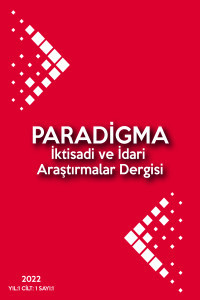ÇALIŞMA HAYATINDA TAI CHI; BİR ALAN DENEYİ ÖRNEĞİ
İş stresi yönetimi, psikolojik iyilik hali, geleneksel spor egzersizleri, Tai Chi Chuan
TAI CHI IN WORKING LIFE: A SAMPLE OF FIELD EXPERIMENT
___
- Aytaç, S. (2009), İş Stresi Yönetimi El Kitabı, Çasgem Yayınları, Ankara.
- Aydın Ş. (2004), “Örgütsel Stres Yönetimi”, DEÜ SBE Dergisi, 6 (3), s. 58.
- Chen W.W., W.Y. Sun. (1997), “Tai Chi Chuan, An Alternative Form of Exercise for Health Promotion and Disease Prevention for Older Adults in the Community”, International Quarterly of Community Health Education, 16 (4), p. 333.
- Clark, Angus. The Complete Illustrated Guide to Tai Chi – A Practical Approach to the Ancient Chinese Movement for Health and Well-being, Harper Collins Publishers, London, 2001.
- Çakır Ö., Aksaraylı M., Çınar E. ve Denizli U. (2013), Türkiye’de Emeklilerin Yaşam Kalitesini Geliştir-mede Öncelikli Faktörlerin Belirlenerek Stratejik Plan Oluşturulması, 111K104 No’lu Tübitak Projesi, İzmir.
- Ertekin Y. (1993), Stres ve Yönetim, Türkiye ve Orta Doğu Amme İdaresi Enstitüsü, Ankara.
- Esch T., Duckstein J., Welke J., Stefano G. B. ve Braun V. (2007), “Mind/Body Techniques for Physio-logical and Psychological Stress Reduction: Stress Management via Tai Chi Training – A Pilot Study”, Med Sci Monit, 13 (11), pp. 488-496.
- Güngören, İlhan. T’ai Chi Ch’uan (Taijiquan) Gölge Boksuyla Hareketli Meditasyon, Yol Yayınları, İstanbul, 2003.
- Klein PJ ve Adams WD., (2004), “Comprehensive Therapeutic Benefits of Taiji: A Critical Review”, Am J Phys Med Rehabil, Volume 83, Sayı: 9, pp. 735-745.
- Kuramato, M. A. (2006), “Therapeutic Benefits of Tai Chi Exercise: Research Review”, Wisconsin Medical Journal, 105 (7), p. 45.
- Muchinsky P. (1997), Psychology Applied To Work, Ltp Company.
- Salmon, P. (2001), “Effects of Physical Exercise on Anxiety, Depression, and Sensitivity to Stress: A Unifying Theory”, Clinical Psychology Review, 21 (1), ss. 33-61.
- Sandlund E. S., Norlander T. (2000), “The Effects of Tai Chi Chuan Relaxation and Exercise on Stress Responses and Well-Being: An Overview of Research”, Human Sciences Press Inc. International Journal of Stress Management, 7 (2), p. 1.
- Soo, C. (1984), The Chinese Art of T’ai Chi Ch’uan, The Aquarian Press, Northamptonshire England.
- Soysal, A. (2009), “İş Yaşamında Stres”, Çimento İşveren Dergisi, s. 17.
- Şen, Cem. T’ai Chi Ch’uan Enerjinin Dansı, Klan Yayınları, İstanbul, 2004.
- Thang, Tri Dang. Yeni Başlayanlar İçin T’ai Chi, Çev. Selim Yeniçeri, Okyanus Yayınları, İstanbul, 2002.
- Wang C. ve diğerleri, (2010), “Tai Chi on Psychological Well-being: Systematic Review and Meta-analysis”, BMC Complementary and Alternative Medicine, 10, s. 23.
- World Health Organization (2012), “Risks To Mental Health”, WHO Discussion Paper, p. 5.
- Yayın Aralığı: Yılda 2 Sayı
- Yayıncı: Gümüşhane Üniversitesi
FİNANSAL ORANLAR İLE FİRMA DEĞERİ İLİŞKİSİ: BIST’TE BİR UYGULAMA
Ahmet KURTARAN, Ayten TURAN KURTARAN, Melike KURTARAN ÇELİK, Zekiye TEMİZER
POLİTİK FAKTÖRLER İLE FİNANSMAN ARASINDAKİ İLİŞKİ ÜZERİNE: TEORİ VE LİTERATÜR
JAPONYA OMBUDSMANI: YAPISAL-KURUMSAL VE İŞLEVSEL YÖNLERİ
BİR YÖNETİM UYGULAMASININ TÜRKİYE BAĞLAMINDA YENİDEN İNŞASI: KURUMSAL YÖNETİM
Ertuğrul KAROĞLU, Onur ÇAPKULAÇ
TALEP SİSTEMLERİNİN RANKI: TÜRKİYE UYGULAMALARI İÇİN BİR LİTERATÜR ELEŞTİRİSİ
ORGANİZASYONLARDA MALİYET TASARRUFU SAĞLAYAN ETKİN BİR STRATEJİ: SANALLAŞTIRMA TEKNOLOJİSİ
Handan ÇAM, Abdulkadir ÖZDEMİR, Abdullah NARALAN
